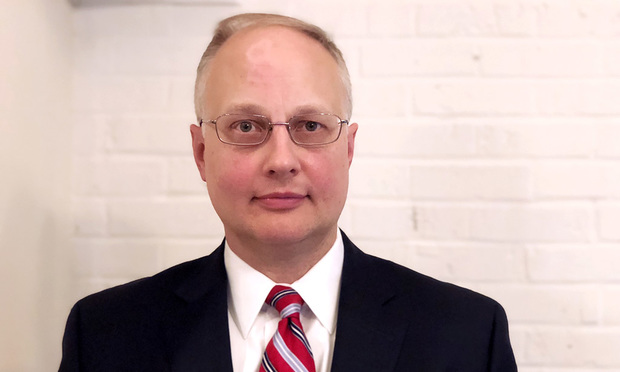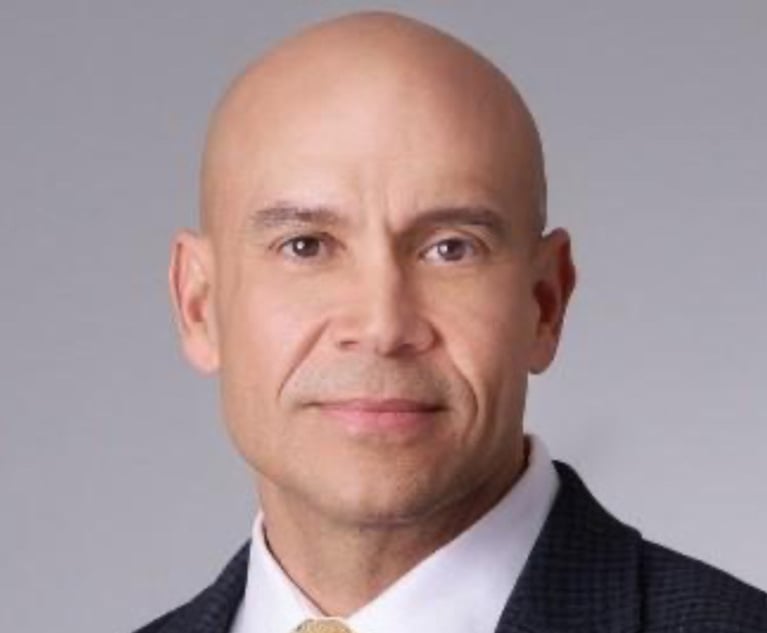Institute for Legal Reform Adds Beltway Insider John Abegg to Help Lead Legal Team
After 20 years of working behind the scenes in government, the chief counsel to U.S. Senate Majority Leader Mitch McConnell will join the U.S. Chamber Institute for Legal Reform in D.C.
May 02, 2019 at 04:57 PM
5 minute read
 John Abegg, executive vice president of the U.S. Chamber Institute for Legal Reform. Courtesy photo.
John Abegg, executive vice president of the U.S. Chamber Institute for Legal Reform. Courtesy photo.
After 20 years of working behind the scenes in government, John Abegg, chief counsel to U.S. Senate Majority Leader Mitch McConnell, has decided to join the U.S. Chamber Institute for Legal Reform in Washington, D.C.
Abegg will become executive vice president of the institute on May 13, replacing Harold Kim, who was promoted to chief operating officer, according to an institute announcement. It said Abegg will provide “advocacy, strategy, policy guidance and management expertise.”
He is no stranger to political legal brawls. After a controversial Senate hearing when Brett Kavanaugh was confirmed as a U.S. Supreme Court justice last October, McConnell thanked his staff, especially Abegg, “my chief counsel and right-hand man for every step of this process.”
McConnell went on to say, “For 15 weeks, John poured his determination, his experience, and his wisdom into this process. He started working the moment Justice [Anthony] Kennedy announced he was stepping down and did not stop until the gavel fell. We wouldn't be here without his work.”
Abegg also played a key role when Senate Republicans sought to overturn President Barack Obama's three recess appointments to the National Labor Relations Board in 2012.
He helped the Republicans form a legal partnership with Noel Canning, a soft-drink bottling company that the labor board said had engaged in an unfair labor practice. Backed by the Republican senators and the U.S. Chamber of Commerce, Noel Canning sued to reverse the labor ruling and won a unanimous decision in the U.S. Supreme Court, which held that Obama's recess appointments to the board violated the U.S. Constitution.
For the case, Abegg worked with Miguel Estrada, the Gibson, Dunn & Crutcher partner who wrote the Senate Republicans' amicus brief. It was sweet political revenge for Abegg and Estrada, who was the federal appeals court nominee blocked from the bench by a Senate Democrats' filibuster in 2002. One of Abegg's ongoing assignments was to guide judge nominations through the judiciary committee and on to confirmation, but he was without a legal move to stop the filibuster.
Besides overseeing the confirmation process for the last six Supreme Court justices, Abegg also helped with the passing of multiple civil justice measures sought by corporations, including institute-backed class action reform.
Institute president Lisa Rickard said in a statement, “John has been one of the Hill's most effective and well respected lawyers for almost 20 years. John's vast knowledge of legal reform will ensure that [the institute] is equipped to take on new challenges as leading advocates for the business community.”
Abegg told Corporate Counsel he chose to join the institute's legal team because “the Chamber has been the foremost advocate for the free market system in this country, and the foremost advocate for assuring a properly functioning legal system for the free market to work.”
He said he has worked with the institute's legal team through the years, believes in its mission and was impressed with its people. His first priority, he said, will be sitting down with the legal team members, “learning their capabilities and helping them advance their goals.”
One strength he brings to the job, Abegg said, is the relationships he developed with the private sector and in all three branches of government.
“I've served in all three branches,” he said, “and I can appreciate the roles and capabilities, as well as the limitations, of all three. That helps me see issues from different perspectives and to solve different legal problems—by [recognizing] whether they are best solved in the courts, the executive branch or the Legislature.”
His work with the Senate Judiciary Committee also included working on corporate privacy measures, legal technology issues, immigration and antitrust matters, he said.
Before working in McConnell's office, Abegg served as legal adviser to a Federal Election Commissioner from 1998 to 1999. He previously was in private practice for five years with the conservative Indianapolis law firm Bopp, Coleson & Bostrom, focusing on election law and campaign finance litigation. The firm later evolved into the Bopp Law Firm.
Abegg received his law degree from the Indiana University Maurer School of Law and went on to clerk for the U.S. Court of Appeals for the Seventh Circuit.
“I had a long and rewarding career in government service,” Abegg said. He added that the opportunity to join the institute's legal team “presented itself and I was excited to pursue it. There's no other place I'd rather begin the next chapter of my career.”
This content has been archived. It is available through our partners, LexisNexis® and Bloomberg Law.
To view this content, please continue to their sites.
Not a Lexis Subscriber?
Subscribe Now
Not a Bloomberg Law Subscriber?
Subscribe Now
NOT FOR REPRINT
© 2025 ALM Global, LLC, All Rights Reserved. Request academic re-use from www.copyright.com. All other uses, submit a request to [email protected]. For more information visit Asset & Logo Licensing.
You Might Like
View All
The Met Hires GC of Elite University as Next Legal Chief

'Everything From A to Z': University GCs Tested by Legal, Financial, Societal Challenges
6 minute read
Ex-Cancer Society CLO Takes Legal Reins of Habitat for Humanity International
3 minute read
$17B Episcopal Church Pension Fund Hires New Legal Chief as Staff Changes Continue
Trending Stories
- 1Inherent Diminished Value Damages Unavailable to 3rd-Party Claimants, Court Says
- 2Pa. Defense Firm Sued by Client Over Ex-Eagles Player's $43.5M Med Mal Win
- 3Losses Mount at Morris Manning, but Departing Ex-Chair Stays Bullish About His Old Firm's Future
- 4Zoom Faces Intellectual Property Suit Over AI-Based Augmented Video Conferencing
- 5Judge Grants TRO Blocking Federal Funding Freeze
Who Got The Work
J. Brugh Lower of Gibbons has entered an appearance for industrial equipment supplier Devco Corporation in a pending trademark infringement lawsuit. The suit, accusing the defendant of selling knock-off Graco products, was filed Dec. 18 in New Jersey District Court by Rivkin Radler on behalf of Graco Inc. and Graco Minnesota. The case, assigned to U.S. District Judge Zahid N. Quraishi, is 3:24-cv-11294, Graco Inc. et al v. Devco Corporation.
Who Got The Work
Rebecca Maller-Stein and Kent A. Yalowitz of Arnold & Porter Kaye Scholer have entered their appearances for Hanaco Venture Capital and its executives, Lior Prosor and David Frankel, in a pending securities lawsuit. The action, filed on Dec. 24 in New York Southern District Court by Zell, Aron & Co. on behalf of Goldeneye Advisors, accuses the defendants of negligently and fraudulently managing the plaintiff's $1 million investment. The case, assigned to U.S. District Judge Vernon S. Broderick, is 1:24-cv-09918, Goldeneye Advisors, LLC v. Hanaco Venture Capital, Ltd. et al.
Who Got The Work
Attorneys from A&O Shearman has stepped in as defense counsel for Toronto-Dominion Bank and other defendants in a pending securities class action. The suit, filed Dec. 11 in New York Southern District Court by Bleichmar Fonti & Auld, accuses the defendants of concealing the bank's 'pervasive' deficiencies in regards to its compliance with the Bank Secrecy Act and the quality of its anti-money laundering controls. The case, assigned to U.S. District Judge Arun Subramanian, is 1:24-cv-09445, Gonzalez v. The Toronto-Dominion Bank et al.
Who Got The Work
Crown Castle International, a Pennsylvania company providing shared communications infrastructure, has turned to Luke D. Wolf of Gordon Rees Scully Mansukhani to fend off a pending breach-of-contract lawsuit. The court action, filed Nov. 25 in Michigan Eastern District Court by Hooper Hathaway PC on behalf of The Town Residences LLC, accuses Crown Castle of failing to transfer approximately $30,000 in utility payments from T-Mobile in breach of a roof-top lease and assignment agreement. The case, assigned to U.S. District Judge Susan K. Declercq, is 2:24-cv-13131, The Town Residences LLC v. T-Mobile US, Inc. et al.
Who Got The Work
Wilfred P. Coronato and Daniel M. Schwartz of McCarter & English have stepped in as defense counsel to Electrolux Home Products Inc. in a pending product liability lawsuit. The court action, filed Nov. 26 in New York Eastern District Court by Poulos Lopiccolo PC and Nagel Rice LLP on behalf of David Stern, alleges that the defendant's refrigerators’ drawers and shelving repeatedly break and fall apart within months after purchase. The case, assigned to U.S. District Judge Joan M. Azrack, is 2:24-cv-08204, Stern v. Electrolux Home Products, Inc.
Featured Firms
Law Offices of Gary Martin Hays & Associates, P.C.
(470) 294-1674
Law Offices of Mark E. Salomone
(857) 444-6468
Smith & Hassler
(713) 739-1250






